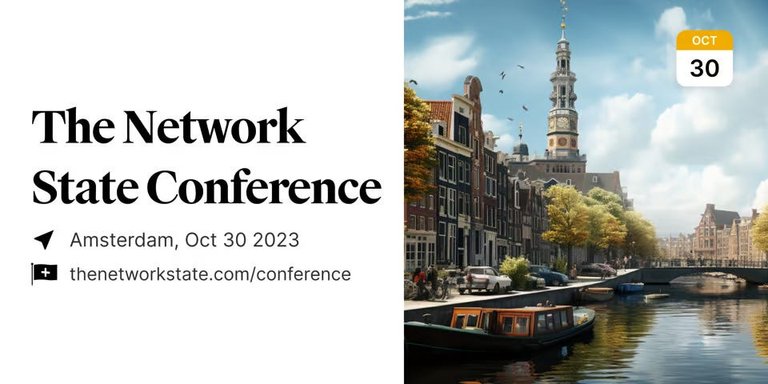I just experienced two interesting events online. Two days ago, there was a Network State Conference held in Amsterdam. I had the opportunity to catch it live on Balaji's YT channel, and boy... that was such a shitshow! People in the chat were embarrassed with the level of talks. We had a running joke that the best part of the whole conference was this live chat. I watched the first half of event so I could have be surprised later, but I just couldn't stand the whole event. This limited attendence brought be these conclusions. Need for decentralized network communities is huge. People are interested and want to learn more.

Meanwhile, the conference organized by Balaji himself was more of a marketing event filled with grifters, people from the real estate, and modern hippies/digital nomads. You know, kind of a "buy my stuff" event but with start-ups. While I have nothing against hippie communities (as long as they don't gentrify my neighborhood) or business people. It was miles, miles away from anything connected with the Network State shape or form. There were these old-school seasteading ideas, ecovillages, construction solutions, and even some blockchain people, but there was nobody really talking about how this blockchain thing should be built in a sustainable way, in a way which works. There was nothing (or veryy little) about infrastructure needed to create a state. I missed Hive so much there! Yes, plumbing is not as sexy as digital nomads dancing in Costa Rica.
Literally, every community in history built as an alternative to the dominant system failed. If it didn't implode because of bad leadership, it was not anti-fragile and ultimately attacked and defeated by outside forces. This is a serious lesson for anybody considering creating a sustainable solution for communities. With the advance of cryptography, decentralized governance, and information technology, for the first time in history, we have all the tools needed to build a sustainable, anti-fragile Network State. I mean, we need to have a solid ground to dance on.

People in the chat seemed to get that. Only with solid "Network" architecture can we think about creating a "State." The way to crowdsourcing the country might be very long if necessary. According to Balaji's words, Network State is not a manual but more of a toolbox. We are free to take whatever we want and build with it. At this point, we can't say what shape a sustainable Network State will take. We are on the frontier of how communities cooperate and organize, and we are free to create this reality unbound to any historical definitions.
Of course, Hive is a protocol that mighe be great for Network States to be build on; it's perfect for that. Can't this statehood be decentralized and sort of anarchistic though? As long as infrastructure and community cater to our fundamental human needs, it's enough to have this minimalistic structure in place. Network States might be not states at all. I mean the whole suits and violence thing might be just obsolete. And what's left is human rights, cooperation, fun and connecting with others within Network.
Claiming Network State is not some grand declaration, not some positioning against other structures. It's a way for people to have a frame of reference. It's also a way for the whole community to have some marketing narrative and identity. In my opinion, we desperately need that for Hive.
There are thousands of people gathered around Balaji's concept with whom we could make a great match here. Claiming Network State is a way of saying, hey, we have very similar ideas and our toolkit here might be of use for you.

The second online event I attended was Hive Town Hall X Space. This one was much more interesting to listen and great way to increase Hive visibility and cooperation between frontends. I'd like to see it more decentralised in the future though. Let's go straght to the meat. I'm aware that the current idea for promotion is marketing of individual projects and this business attitude. Hive growth is suppose to be just a side effect. It's great Hive has this fractal nature, we can have communities within communities, and communities within businesses. And in theory it could have worked, right? However, without VC money and Web 2.0 presence, we start handicapped at the beginning. Even if it allows running your business freely, Hive is (luckily) not a project of a business focus primarly. We don't have leverage to compete with dApps on other chains. Furthermore, Hive is not than just projects on Hive. It's much more, our focus on community and distribution is unique, something where this chain really shines brightly! We need to take that into account when we think about marketing. But it needs to be clever. Word community is so worn out... This matter is important not only for me, the need for a consistent narrative about Hive was voiced during the town hall many times.
So my call here would be this: read at least first chapters of Balaji's book. Decided by yourself if Hive fits it. If you find it convincing just talk about Hive as a Network State. Claim it by yourself. Simply. At the end, it's permissionless, isn't it?





